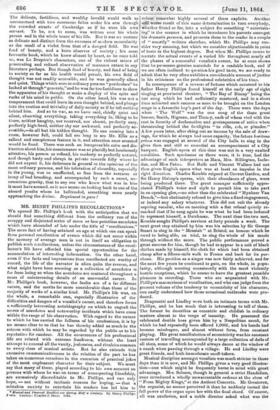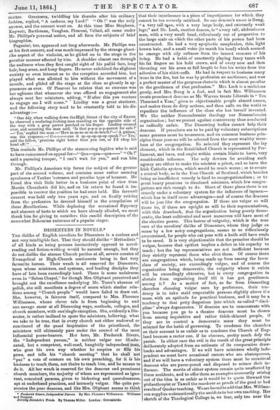MR. HENRY PHILLIPS'S RECOLLECTIONS.*
WL opened Mr. Phillips's book with the anticipation that we should find something different from the ordinary run of the scrappy and disjointed series of more or less pointless anecdotes which have abounded of late under the title of "recollections." The mere fact of having attained an age at which one can speak from personal recollection of events which did not occur within the memory of average men is not in itself an obligation to publish such recollections, unless the circumstances of the recol- lector's life have afforded him special opportunities for the accumulation of interesting information. On the other hand, even if the facts and impressions thus recollected are worthy of record, the life of the narrator is often quite the reverse, and what might have been amusing as a collection of anecdotes is fur from being so when the anecdotes are scattered throughout a mass of uninteresting details of an uneventful career. In Mr. Phillips's book, however, the faults are of a far different nature, and the merits far more considerable than those of the majority of works of a similar kind. Mr. Phillips's life was, on the whole, a remarkable one, especially illustrative of the difficulties and dangers of a vocalist's career, and therefore forms a sufficiently interesting autobiography on which to engraft the scores of anecdotes and noteworthy incidents which have come within the range of his observation. With regard to the extent to which be has carried the fullness of his confessions, it is by no means clear to us that he has thereby added as much to the esteem with which lie may be regarded by the public as to his reputation for candour. All the occurrences of his professional life are related with extreme frankness, without the least attempt to conceal all the vanity, jealousies, and rivalries common to every class of musical artists. But he also extends this excessive communicativeness to the relation of the part he has taken on numerous occasions in the execution of practical jokes of the most unpleasant character for their subject. We must say that many of these, played according to his own account on persons with whom he was on terms of unsuspecting friendship, are excessively discreditable to Mr. Phillips, and can only hope, — not without intrinsic reasons for hoping, — that a mistaken anxiety to entertain his readers has led him to 'I Musical and Personal Recollect on: during Half a Century. By Henry Phillipe. 2 Tole. London : Charles J. Skeet. 1t64.
colour somewhat highly several of these exploits. Another still -worse result of this same determination to turn everybody, - whether friend or foe, into a subject for something " entertain-
ing" is the manner in which he introduces his parents amongst his dramatis persona, and presents them to the reader in a couple of " smartly" written sketches, which Mr. Phillips may con- sider very amusing, but which we consider objectionable in point of taste in the highest degree. But when Mr. Phillips comes to narrate the actual events of a varied life throughout nearly all the phases of a successful vocalist's career, he at once shows that he possesses genuine materials for a readable book, and if we are often inclined to question his good taste, we are ready to admit that he very often exhibits a considerable amount of justice in his criticisms on the professional celebrities of his time.
In consequence of a reverse of fortune which occurred to his father Henry Phillips found himself at the early age of eight singing at provincial theatres, "The Bay of Biscay" being the one song which he had sufficiently mastered, and in a short time achieved such success as soon to be brought on the London stage in a favourite boy's part of the day. These were the days when " The Wolf" was the one song of the thnoe great bassos, Smith, Higman, and Tinney, each of whom vied with the rest in ferocity of declamation and grotesqueness of attire when threatening behind the footlights "to rifle, rob, or plunder." A few years later, after eking out an income by the sale of draw- ings, for which he always had some capacity, the future baritono primo was engaged at several of the City halls to sing in the glees then and still so essential an accompaniment of a City banquet. English opera at this time was not in a very exalted condition. Such specimens as there were, it is true, had the advantage of such interpreters as Mara, Mrs. Billington, Lode- don, and Miss Paton. But Balfe and Vincent Wallace had not then given English opera what was at keit an impulse in the right direction. Charles Kemble reigned at Covent Garden, and Sir Henry Bishop's operas, with their abundance of glees, were being produced there. The great manager sufficiently appre- ciated Phillips's voice and style to permit him to take part in an opening glee,—no other than the celebrated " Mynheer Van Dunck,"—but obstinately refused to give him a fixed engagement, or indeed any salary whatever. This did not suit the already aspiring vocalist, who on meeting with a flat refusal quietly re- marked that if he sang again he was what he had been induced to represent himself, a Dutchman. The next time the two met, Kemble sought Phillips's services at forty pounds a week. The next great step attained by him was his selection by Sir George Smart to sing in the "Messiah" at Bristol, an honour which he owed to beinec able, on trial, to sing the whole of his music through without the score. The public performance proved a great success for him, though he had to appear in a suit of black clothes made by himself, the cloth for which had been obtained cheap after a fifteen-mile walk to Frome and back for its pur- chase. His position as a singer was now fairly achieved, and for the next few years he continued to gain, on the whole, in popu- larity, although meeting occasionally with the most violently hostile receptions, which he seems to have the greatest possible pleasure in recording. Those who are acquainted with Mr. Phillips's mannerisms of vocalization, and who can judge from the present volume of the tendency to eccentricity of his character, can easily understand how those occasional outbreaks were pro- duced.
Dragonetti and Lindley were both on intimate terms with Mr. Phillips, and he has much that is interesting to tell of them. The former he describes as eccentric and childish in ordinary matters almost to the verge of insanity. He possessed the celebrated double bass given him by a Neapolitan monk, for which he had repeatedly been offered 1,0001., and his hands had become misshapen, and almost without form, from constant playing. His great manifestation of eccentricity was his constant custom of travelling accompanied by a large collection of dolls of all sizes, some of which he would always dance at the window of a coach when passing through a village. He and Lindley were great friends, and both immoderate snuff-takers.
Musical discipline amongst vocalists was much stricter in those days than it is now, and Mr. Phillips gives a very good illustra- tion—one which might be frequently borne in mind with great advantage. Mrs. Salmon, though in general a strict Handelian, once introduced a wholly unwarrantable cadenza at the close of "From Mighty Kings," at the Antient Concerts. Mr. Greatorea, the organist, no sooner perceived it than he suddenly turned the full power of the organ upon her with the final chord. Of course, all was confusion, and a noble director asked what was the
matter. Greatorex, twiddling his thumbs after his ordinary fashion, replied, "A cadenza, my Lord!" "Oh !" was the only answer, and the concert went on. At this time Miss Stephens, Knyvett, Bartleman, Vaughan, Pisaroni, Veiled, all came under Mr. Phillips's personal notice, and all form the subjects of brief biographies.
Paganini, too, appeared not long afterwards. Mr. Phillips was at his first concert, and was much impressed by the strange ghost- like aspect of the violinist, as he glided on to the stage in the peculiar manner affected by him. A shudder almost ran through the audience when they first caught sight of his pallid face, long hair, long arms, and bony fingers. He never exhibited the slightest anxiety or even interest as to the reception accorded him, but played what was allotted to him without the movement of a muscle, and glided off the stage at the close as ghostly in ap- pearance as ever. Of Pisaroni he relates that so extreme was
her ugliness that whenever she was offered an engagement she always sent- her miniature, adding, " Hailer this you venture to engage me I will come." Lindley was a great stutterer,
aud the following story used to be constantly told to his dis- advantage :—
" One dtty, when walking down the High Street of the city of Exeter, he observed a seafaring-looking man standing on the opposite side of the way with a grey parrot perched on his finger. Lindley crossed over. and accosting the man said, 'Is that p-p-p-p-p-parrot for sale ?' —' Yes,' replied the man =How m-m-m-m-m-m-much?'--` A guinea,' was the response.—i 0-c-c-c-c-can it sp-sp-sp-sp-sp-speak ?'—` Yes,' said the fellow, `precious sight better than you can, or I'd chop his head off.!. r This reminds Mr. Phillips of the stammering fugitive who is said
to have coriamenced an appeal for—" Qua—qua—qua—" "Oh 1" said a pursuing trooper, "I can't wait for you," and ran him through.
Mr. Phillips's American trip forms the subject of the greater part of the second volume, and contains some rather amusing specimens of Yankee 'cuteness and peculiar type of humour. He found this visit little better in a business point of view than Martin Chuzzlewit did his, and on his return he found it im- possible to recover the position he had once held. His farewell concert was held only two years ago, and on finally retiring from the profession he devoted himself to the compilation of these Recollections. While deploring the occasional flippancy and absence of taste to which we have already alluded, we must thank him for giving to outsiders this candid description of the somewhat Bohemian existence of a popular singer.





























 Previous page
Previous page